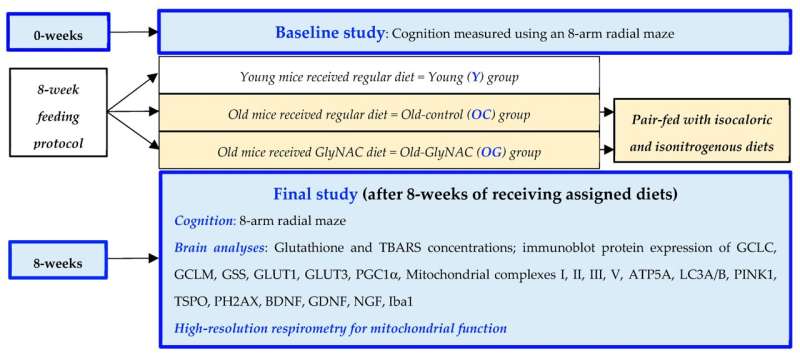This article has been reviewed according to Science X's editorial process and policies. Editors have highlighted the following attributes while ensuring the content's credibility:
fact-checked
peer-reviewed publication
trusted source
proofread
GlyNAC supplementation found to improve cognitive decline and brain health in aging

As people get older, they aspire to live healthy lives as free as possible from the natural decline of cognitive abilities that occurs with aging. At Baylor College of Medicine, researchers have been studying the biological underpinnings of age-associated cognitive decline and developing nutritional strategies to promote healthy brain aging.
They report today in the journal Antioxidants that supplementing GlyNAC—a combination of glycine and N-acetylcysteine as precursors of the natural antioxidant glutathione—improved or reversed age-associated cognitive decline in old mice and improved multiple associated defects in the aging brain.
The findings are consistent with improvements observed after supplementing older adults with GlyNAC, as reported in their 2021 pilot human trial; therefore, the findings reported here are likely applicable to humans.
"For over two decades, my lab has been studying natural aging in older humans and aged mice," said corresponding and senior author Dr. Rajagopal Sekhar, professor of medicine—endocrinology, diabetes and metabolism at Baylor.
"Our work provides an understanding of how age-associated cognitive decline in older humans is linked to glutathione deficiency, increased oxidative stress, mitochondrial dysfunction, abnormal glucose metabolism and insulin resistance, inflammation and low levels of neurotrophic or neuron-supporting factors, and that supplementing GlyNAC reverses these defects and improves cognition."
Human studies only permit measurements at the whole-body level, so in this study the researchers studied mice to investigate defects directly in the aging brain.
This study is important for many reasons: it assesses the reversibility of naturally occurring cognitive decline in aging instead of cognitive decline resulting from introducing gene defects; increased age is identified as the most important risk factor for Alzheimer's disease; and these naturally occurring defects were studied directly in the brain.
Sekhar and his team worked with three groups of mice. Two groups were aged naturally side-by-side until they were 90 weeks old, which is similar to a 70-year-old person. At 90 weeks of age, both groups of old mice were evaluated for their cognitive abilities, such as remembering the correct route in a maze that leads to a food reward.
These results were compared to those of young mice, the third group. Then, one group of old mice began a GlyNAC-supplemented diet, while the other group, called the old-controls, continued their regular diet without GlyNAC supplementation.
After completing eight weeks on their respective diets, the animals' cognitive abilities were evaluated again and their brains analyzed to measure specific brain defects that had previously been associated with cognitive impairment in studies by others. The results of these analyses in old mice supplemented with GlyNAC were compared with those of the old-control group and with the corresponding data obtained from young mice.
"We were very excited with the findings of this study," Sekhar said. "Compared to young mice, old mice had cognitive impairment and many brain abnormalities such as glutathione deficiency, increased oxidative stress, impaired mitochondrial function, elevated inflammation, genomic damage and lower levels of brain-supporting factors. Importantly, we found evidence that there was a shortage of transporters responsible for moving glucose, the main fuel for the brain, into this organ."
"This problem gets worse because the mitochondria, the engines that burn glucose to provide energy, were also not working well in the brain. The brain requires a very large amount of energy for its function, and these defects suggest that the aging brain is starved of energy, which could result in cognition decline."
GlyNAC supplementation in old mice corrected brain glutathione deficiency, improved brain glucose transporters, reversed mitochondrial dysfunction and improved cognition. In addition, GlyNAC supplementation reduced oxidative stress, inflammation and genomic damage and improved neurotrophic factors.
"It is really exciting to see so many improvements in the brain with GlyNAC supplementation, as it provides evidence that it may now be possible to improve brain health in aging," Sekhar said. "Going forward, we plan to conduct a larger randomized clinical trial in older people to study the effect of GlyNAC supplementation on improving cognitive and brain health in aging."
Previous rodent studies from the Sekhar lab reported that GlyNAC supplementation improved similar biological defects in the heart, liver and kidneys, and also increased length of life. A recently published randomized clinical trial in older humans provided evidence of similar improvements in skeletal muscle and blood and reversal of aging hallmarks.
The results of this study are consistent with these prior studies and make an advancement by supporting the beneficial role of GlyNAC supplementation to specifically promote brain health and support cognitive function in aging.
"In addition, our findings may also have implications for Alzheimer's disease and mild cognitive impairment, because similar defects are also reported in these conditions," Sekhar said. "We are currently evaluating whether older people with mild cognitive impairment have glutathione deficiency, compared to older people without a diagnosis of cognitive impairment."
More information: Premranjan Kumar et al, GlyNAC (Glycine and N-Acetylcysteine) Supplementation in Old Mice Improves Brain Glutathione Deficiency, Oxidative Stress, Glucose Uptake, Mitochondrial Dysfunction, Genomic Damage, Inflammation and Neurotrophic Factors to Reverse Age-Associated Cognitive Decline: Implications for Improving Brain Health in Aging, Antioxidants (2023). DOI: 10.3390/antiox12051042. www.mdpi.com/2076-3921/12/5/1042





















